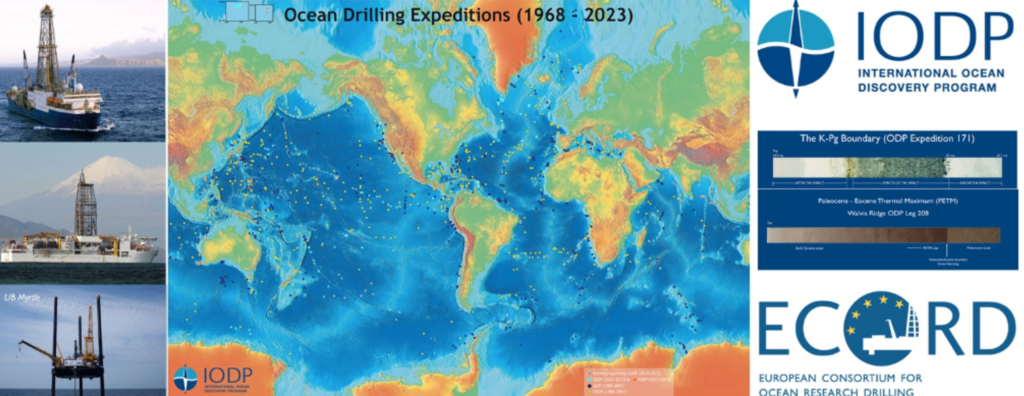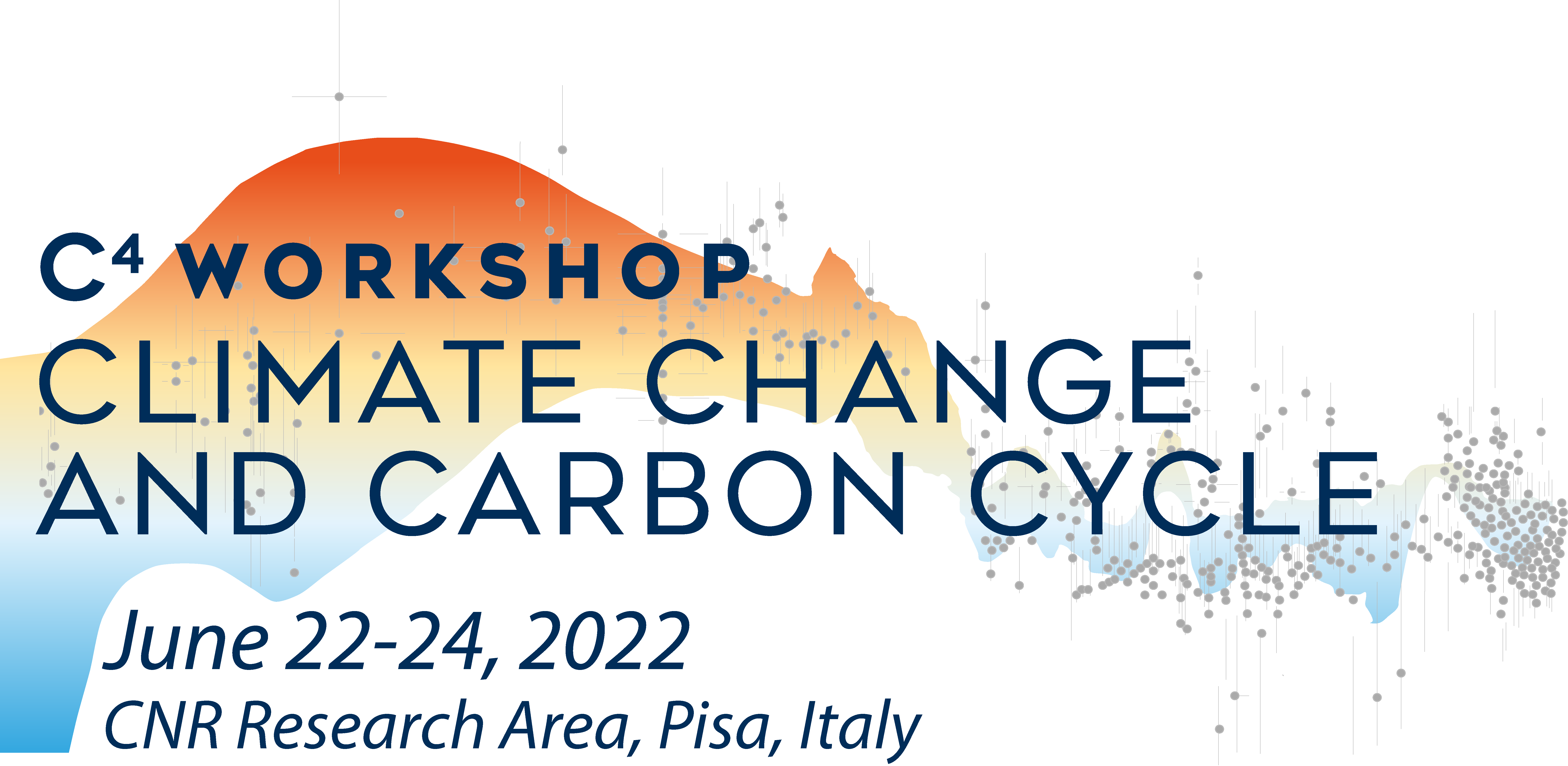The International Workshop C4 “Climate Change and Carbon Cycle” (Pisa, 22-24/06/2022) envisions knowledge exchange and cross-pollination within the scientific communities interested in Global Changes, Climate System and Carbon Cycle through time. Predicting interactions between Earth’s climate and carbon cycle is challenging because of the volume of feedback and the number of processes involved. A growing wealth of geosphere, atmosphere, ocean, and ecosystem reconstructions and observations has provided essential insights into how climate change affects the ways that carbon moves through Earth’s environment from the deep past to the modern era, and into how carbon cycle perturbations affect climate system. Yet, many fundamental questions remain unanswered. Perhaps the most challenging and societally relevant is whether the rate at which the land and ocean can sequester carbon will continue to keep pace with rising carbon dioxide emissions and the impact on Earth systems that could be associated with it. To face this important challenge, we aim to discuss the frontiers of a new interdisciplinary research in which the integration of the different geological, biological, anthropic components, together with new emerging technologies, will produce a novel, global scientific view of the Earth System across time scales.
The overarching goal of C4 is to foster novel opportunities for collaborations among scientists by bringing together experts from different disciplines.
C4 welcomes contributions from proxy records of the deep geological past to modern observations and modelling that (i) explore linear and nonlinear processes resulting from interactions between climate system and carbon cycle at multiple time scales, (ii) provide insights into the past and present expression of combined climate and carbon changes in environments and ecosystems, and (iii) highlight the current knowledge gaps and how they can be filled through the combined efforts of the Climate, Paleoclimate and Carbon Cycle communities.
The C4 Workshop (Pisa, 22-24/06/2022) is promoted and organized by the Working Groups “Paleoclimate Dynamics” and “Carbon Cycle” of the Department of Earth System Sciences and Environmental Technologies of the National Research Council of Italy (DSSTTA-CNR).
Download and circulate the C4 workshop flyer among your colleagues and networks
FINAL PROGRAM:
The final workshop schedule is now available. Here you can find the final program
Oral presentation will be 12 minutes for the talk, followed by 3 minutes for questions and discussion
Poster: each poster will be introduced by a 2 minutes poster presentation.
REGISTRATION
The workshop will be limited to 100 people for logistic reasons, so we encourage registering early.
REGISTRATION: to register please click here.
ABSTRACT SUBMISSION: within Saturday 30th April 2022
This is the mandatory deadline for people submitting an abstract
Please send the abstract to c4.workshop@cnr.it indicating in the object the preferred session and mode of presentation (poster or oral) e.g. FRONTIERS/ORAL using the following template.
FEES
The registration fee includes the opening icebreaker with food and drinks, lunches, and coffee breaks. Please indicate any dietary restrictions on the registration form.
Early payment (extended deadline, within Saturday 30th April 2022) = 90 €
Please note that the early payment fee will be also applied to potentially unsuccessful grant applicants
Late payment (within Friday 20th May 2022) =120 €
GRANTS
A limited number of grant will be available for presenting Ph.D and Post-Doc students and for early career and senior scientist from developing or low-income countries.
Grants will cover the registration fee and the accommodation in Pisa.
Please send a brief CV, the submitted abstract and a motivation letter at: c4.workshop@cnr.it
The deadline for grant application has been extended until April, 30th
VENUE
The National Research Council of Italy – Research Area of Pisa is located near the Pisa city centre (10 minutes by walk). The Pisa International Airport G. Galilei and the railway station are few kilometres apart and are connected by urban bus (every 20 minutes). Numerous hotels and tourist facilities are located within walking distance as well as along the urban service lines.
Recommendations to 4C participants to reduce their (trip) carbon footprint
– If possible, travel by train (Pisa is well connected with Florence Central)
– If train is not a feasible option, consider to delegate the participation to your colleagues or travel by car. In this latter case, consider to share the car with one or more colleagues and/or utilize this trip for accomplish multiple purposes (i.e. saving future trips).
– If no other option are available, travel by plane. In this latter case, to minimize/compensate your carbon footprint, you could (e.g.) fly economy, travel light, purchase carbon offsets, use low-carbon transportation at destination.
SESSIONS
The workshop (Pisa, 22-24/06/2022) will be organized around three highly interdisciplinary scientific sessions – Processes, Impact & Frontiers – aimed at integrating different scientific perspectives and embracing a wide temporal range, from the million-year scale of geological processes, the thousand-year scale of the orbitally-driven and sub-orbital climate changes of the Quaternary through to the yearly (and sub-yearly) scale of modern monitoring and observations.
Processes
This session aims to provide a better understanding on how fast and slow feedback in the carbon cycle operates to modulate the evolution of climate and its sensitivity to forcing through time, and to explore processes, triggers and tipping points acting on multiple time scales. It welcomes contributions on bidirectional interactions between the global carbon cycle and the climate system in the terrestrial and marine environments, from the deep past to the present, and reconstructed with different approaches (sedimentology, geochemistry, stratigraphy, monitoring, global observation, numerical modelling). Examples include long and short-term C cycle perturbations and climate feedback related to geological processes, climate driven perturbation on the carbon cycle operating on the millennial time scale, and modern observations on how the current anthropic climate change affects carbon patterns in different environments and climatic regions.
Key note speaker: Marie Edmond (University of Cambridge)
Invited speaker: Ana Bastos (Max Planck Institute for Biogeochemistry, Jena, DE)
Impacts
This session aims to analyse the expression of global changes linked to climate and carbon cycle on the different components of the Earth System across multiple time scales, and with a multi-disciplinary and comprehensive approach. It welcomes contributions on past, present and future impacts of carbon cycle changes on the atmosphere, lithosphere, cryosphere, hydrosphere and biosphere, as well as studies exploring the responses of ecosystem and environments to different combinations of climate boundary conditions and GHG forcing in the past and in the present. Examples include reconstructions of major environmental and biological changes from the geological/biological records, studies on past, present and future ocean acidification, ecosystem carbon uptake and cryosphere dynamics and related implications for climate policy.
Key note speaker: Richard Sanders (National Oceanography Centre, UK)
Invited speaker: Christoph Nerhbass-Ahles (Cambridge University, UK)
Frontiers
This session aims to face the scientific and analytical frontiers in carbon cycle-climate system dynamic research, to identify common/trans-scale knowledge gaps and to stimulate discussion on how a combined effort of the paleo- and present- scientific communities can push forward the current research boundaries. It welcomes contributions on trans-disciplinary approaches aimed at reconciling results from different methods and scales, research dealing with missing budget, reservoir, processes and their influence on the formulation of past trends and on future scenarios. Studies on novel techniques and conceptual strategies to reconstruct the past, to assess the present and to model the future interactions between the carbon cycle and the climate are welcome. Examples include studies on missing/unknown processes, new technological advances, proxy development, development of measurement network, integration of optimized biogeochemical cycle and climate components in numerical models.
Key note speaker: Bärbel Hönisch (Lamont-Doherty Earth Observatory, Columbia University, USA)
Invited speaker: Dennis Höning (Potsdam-Institute for Climate Impact Research, DE)
INTERACTIVE LABORATORY
Through interactive and immersive laboratories, we aim to identify areas of common interest and stimulate the discussion on global changes, climate changes and carbon cycle. Participants will split into groups and will alternate in the following three proposed research topics:

Observation and Prediction: two sides of the same coin
Co-organised by ICOS-Italia
Led by Alessio Collalti and Paolo Cristofanelli
This laboratory aims to provide an introduction to the coupling between observational datasets (by using the dataset produced by ICOS-RI as “textbook” example) and vegetation numerical modelling for carbon cycle investigations. RQs: How observational data can be used for (and within) vegetation modeling? How observational data are produced, how they can be found and used? What is the backbone of a vegetation model? How is a vegetation model working? How vegetation models can be used for interpreting atmospheric CO2 observations? These are examples of general questions that this laboratory will address to identify challenges in the present-day atmosphere-land interaction and to make predictions about the future under climate change.

Discovering the Deep
Co-organised by IODP-Italia
Led by Chiara Boschi, Annalisa Iadanza, Tommaso Tesi and Karen Gariboldi
In this laboratory, we will present the International Ocean Discovery Program (IODP), which is the longest international marine research collaboration that explores Earth’s history and dynamics. Over a half-century, IODP has proved the theory of plate tectonics and redefined how we view life on Earth by revealing the exceptional geodiversity associated with an enormous variety of life in the deep marine biosphere. And much more remains to be learned. Three unique replicas of ODP and IODP drilled cores supplied by ECORD will be displayed during this laboratory: Tahiti Sea-Level (IODP Expedition 310), Paleocene Eocene Thermal Maximum (Walvis Ridge – ODP Leg 208), Cretaceous-Paleogene (K/Pg) mass extinction boundary (Blake Nose Paleoceanographic Transect – ODP Leg 171B). The cores record critical paleoclimatic events through geological history.

Walking through the Earth: a hands-on experience
Led by Giancarlo Bachi, Ilaria Baneschi, Irene Cornacchia, Paolo di Giuseppe, Olga Gavrichkova, Simona Retelletti, Andrea Rielli, Chiara Santinelli, Andrea Scartazza, Simone Vezzoni
Are you interested in discovering more about scientific and practical challenges when dealing with carbon cycle, paleoclimate and global changes? Three laboratories will walk you through the understanding of the Earth from different perspectives (surface to deep), matrices (air, water, vegetation, soil and rocks), and time scales (minutes to millions of years). Choose between 1) a journey through the hydrosphere’s carbon cycle; 2) a path into the geological record of carbon cycle dynamics, deep past perturbations and related climate changes, from rock samples to analytical techniques; 3) a journey to discover the fate of a carbon atom in a terrestrial ecosystem along the soil-plant-atmosphere continuum. In each laboratory, you will have a glimpse of the practical and challenging aspects of the researches on these topics, taking part in an interactive experience.


